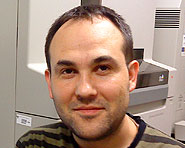
Dr. Fernando Rendo
Position: Post-doctoral researcher at the Sequencing and Genotyping Facilities.
Contact:
fernando.rendo@ehu.es
Tlf: 0034 94 601 34 71
Fax: 0034 94 601 35 00
Fernando Rendo holds a PhD in Biological Sciences from the University of the Basque Country (UPV/EHU) (PhD title: Forensic and Population Genetics in ovine, bovine and equine local breeds of the Basque Country and Navarre, September 2010, under the supervision of Dr. Andone Estonba from the UPV/EHU and Dr. Eva Ugarte from NEIKER-Tecnalia).
His research activity is mainly focused on Population Genetics, Forensic Genetics and Genetic Association Studies. His initial research was aimed to improve management in conservation programs and the genetic improvement of local farm animals based on discrete panels of genetic markers (microsatellites, SNPs and sequences). Concretely, as a result of these initial studies, he has contributed to the development of several DNA tools for animal identification and genealogy controls in ovine, bovine and equine local breeds. In addition, his work has also led to the identification of several genetic markers related to traits of interest, such as SNPs related to coat color in horses and QTLs affecting milk production in sheep. The results of his research are reported in 7 peer review papers (plus 1 submitted), 1 book and 2 online book chapters, as well as 20 communications to conferences (2 oral, 18 posters). Fernando has become an active member of the GHEP-ISFG (Spanish and Portuguese-speaking working group of the International Society for Forensic Genetics) and ISAG (International Society for Animal Genetics).
Currently, he works as a post-doctoral research technician at the Sequencing and Genotyping Unit from the Genomics Facilities of the University of the Basque Country (SGIker – UPV/EHU). In particular, he collaborates in microsatellite based genealogy controls in several species, and in high-throughput SNP genotyping projects using Taqman OpenArray (Life Technologies) and Biomark (Fluidigm) Genetic Platforms, in order to implement panels of genetic markers obtained from these high-throughput genotyping platforms and from Next Generation Sequencing (NGS) projects.
